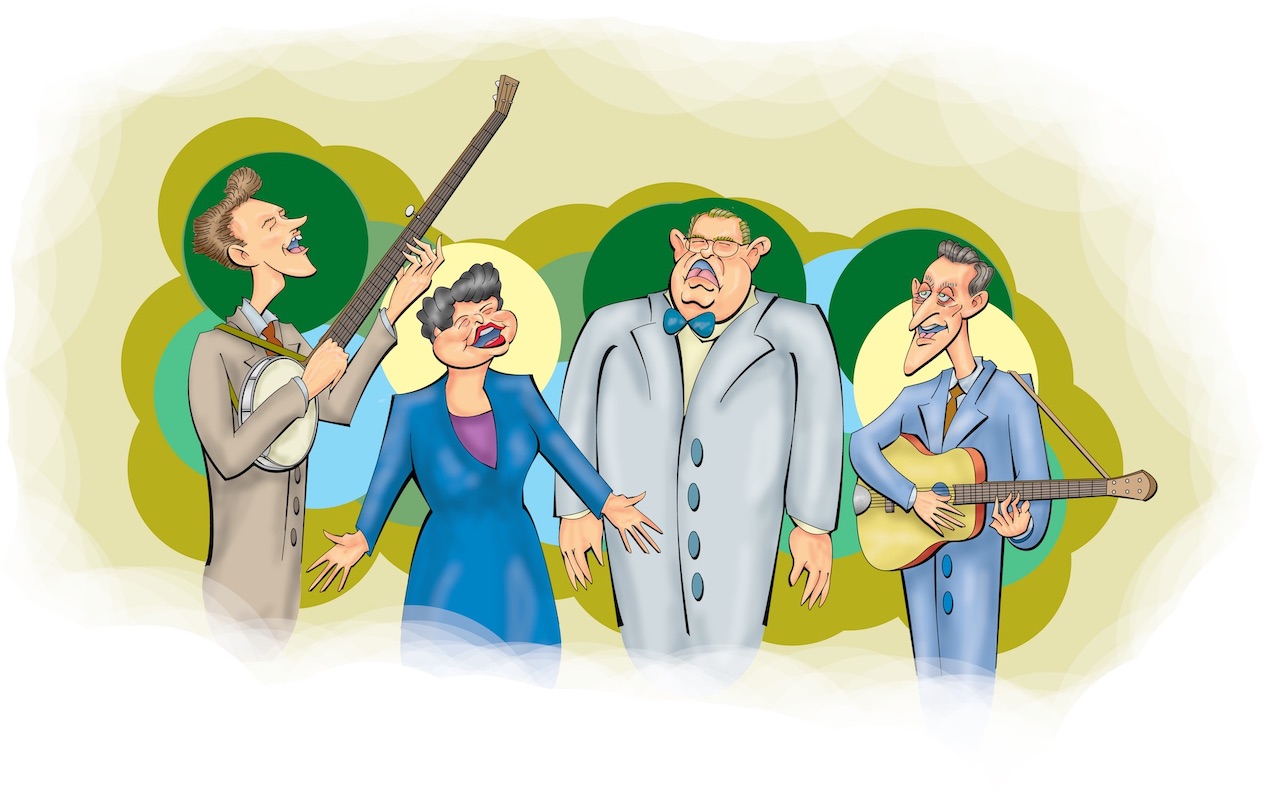Cisco Houston
and Friend
(Click to Zoom In and Out)
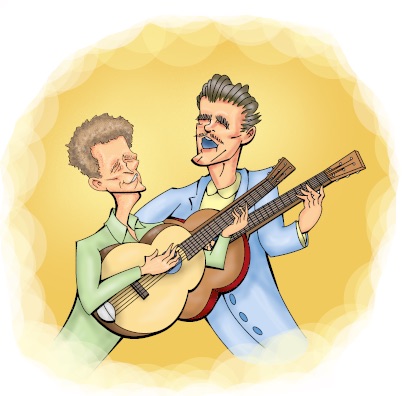
(Pssst. That's Cisco on the right.)
As hard as it is to believe there are actually
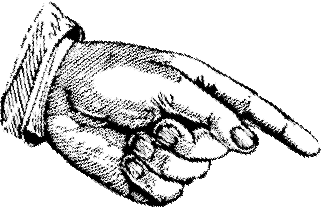


... who absolutely hate folk music. Particularly traditional folk music. It's boring, they say. The topics trite and formulaic. Besides, they ask,
Why the HEY can't folk singers
SING?
I mean, listen to the recordings! The voices are screeching, strained, and - yes - out of tune. Why, the records sound like someone had found some old singer who hadn't picked up an instrument in forty years! Then they give him a guitar and ask him to sing.
Huh! Who would do something like that?
But what was worse is that these "authentic folks songs" (note quotes) set a "standard" (quotes again) where modern "folk artists" (yep, more quotes) seem to think anyone who can sing and sounds pleasant isn't "authentic" (quotated). So they must needs be banished from the folks scene altogether and be relegated to (ptui) easy listening!
Of course in the olden days of the real world there were folk singers who could sing without sounding like a gelded soprano banshee. For instance, in the 1920's and 1930's one of the most popular of the Appalachian Old Time String Bands was the Skillet Lickers. The lead singer, Riley Puckett, sang with a strong baritonic timbre and Lowe Stokes, one of the last surviving Skillet Lickers, credited a lot of their success with Riley's singing.
But it wasn't just because he had an excellent singing voice that many people have never heard of Gilbert Vandine Houston. Gil was born in Wilmington, Delaware in 1918 although he would sometimes tell people he was born in Virginia. We admit it. As much as we like their music, the early urban folk singers were not above a bit of posturing.
In the 1930's the family moved to the Los Angeles suburb of Eagle Rock. Young Gil was a good student even though he suffered from nystagmus, a condition marked by uncontrolled and rapid eye movements. Nystagmus results in poor vision and impaired depth perception and often makes reading difficult. Although it can be treated, it can't be completely cured.
As the Great Depression wreaked its havoc, Gil left home. He worked on ranches, in lumber camps, and on farms. Somewhere along the line he picked up the name Cisco after a tiny and now essentially non-existent town about 70 miles northeast of Sacramento. To pass the little leisure time he had, Cisco would sing while accompanying himself on the guitar.
In 1938 - the Depression was still on at this late date - Cisco was back in Los Angeles. There he began studying acting and met the well-known Shakespearean thespian Will Geer. Yes, this was the Will Geer who would later play the grandfather on the TV series The Waltons.
In those cash-strapped days, a popular pastime was listening to the radio. And it was in LA that Cisco heard a folk singer on the local station KFVD. This was Woody Guthrie who with his singing partner Maxine "Lefty Lou" Crissman had a fifteen minute show, three times a day. Although many radio performers were paid nothing (the station owners considered the publicity was payment enough), Woody and Maxine had a base salary of $20 per week plus an extra $15 for each sponsor the advertising man could drum up. Woody's share was about $30 a week which was a quite liveable salary although he was supporting a wife and two kids.
Cisco went to KFD and met Woody. Soon they began sitting down and singing together. When Woody's program folded the next year, they went out on the road and began singing at labor rallies and other functions.
By 1940 Cisco and Woody had rambled up and over to New York where Will was performing on Broadway in Tobacco Road. At first Cisco worked as a doorman at a theater that specialized in - ah - "exotic dancing", but he soon joined the Merchant Marines. When back onshore he would sometimes appear with a folk group with the perplexing name of The Almanac Singers. The Almanacs had a fairly flexible membership but the originals were Pete Seeger, Lee Hayes, Agnes Cunningham (called "Sis"), her husband Gordon Friesen, and Woody1.
Footnote
There can be a lot of confusion exactly when Woody's radio program on KFVD began and ended. Actually there wasn't just one program as there were intermittent hiatus which ranged from 1937 to 1941.
What happened was that in 1937 Woody's cousin Jack (later a fairly big country and western star) convinced Frank Burke, the owner of KFVD, to let him and Woody have a 15 minute radio spot each day (without pay). Woody played the part of Jack's sidekick and sang the occasional solo. But the program had a strong country and western slant as Jack's preference was for cowboy songs and this set the tone of the show.
Living next door to Woody was the Crissman family and he found that Maxine's voice produced a particularly good harmony with his. Around September he and Maxine sang together on the show and soon Jack dropped out to get steadier work in construction. From then until June 1938 Woody and Maxine sang together and were paid for their appearances.
However, the show underwent an interruption. In January 1938 Woody along with Maxine and a number of his relatives including Jack and Woody's uncle and aunt, Jeff and Allene, wrangled a show on the Mexican station XELO in Tijuana. These "border blasters" were owned by and promoted the products and - ah - "services" - of the courteously titled "Dr." John "Goat Gland" Brinkley. The Singing Guthries Show (which we'll use for want of a better name) lasted less than a month and Woody and Maxine returned to KFVD.
Doing three shows a day began to wear Maxine down and the program ended in June 1939. Woody was then asked to travel around and investigate the plight of the migrant workers. Maxine and her family also relocated and she was able to sing with him during Woody's travels and this also seems to be when Woody and Cisco traveled together.
After his time in New York from 1940 to early 1941 when he essentially walked off the lucrative job on "Pipe Smoking Time" on CBS, Woody returned to Los Angeles and began performing solo - and without pay - back on KFVD. However, Woody had refused to criticize Russia when it agreed to a non-aggression pact with Nazi Germany and this put him in conflict with Frank Burke who had seen the Soviet Government as an opponent of Hitler and Fascism. The details were never clear but Woody's show soon ended and for good.
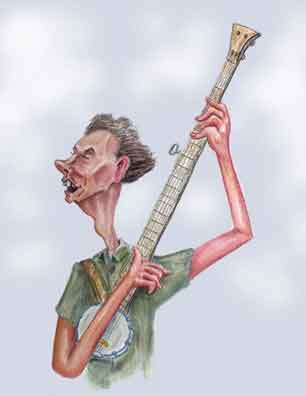
Pete Seeger
The Original Almanacker
Woody also joined the merchant service and shipped out with Cisco on three voyages. Their official job was as stewards serving meals. But they would also perform for the troops that were being carried over to Europe. Once they went below to sing while they were being shadowed by German submarines.
It was in New York that Woody walked into the cramped recording studio of Moses Asch and said he wanted to make some records. Moe had never heard of Woody but let him cut some sides. At that time Moe's label was called Asch Records, but in 1948 the name was changed to Folkways to better fit the genre of the music.
It was in 1944 that we hear Cisco when he joined Woody in Moe's studio. When he performed with Woody, Cisco usually provided a high tenor harmony. But when he sang solo, Cisco's voice was a pleasant baritone, almost a bass. Given that Cisco had such a good voice, it was inevitable that he would soon record his own albums for Folkways and for another folk label, Elektra.
Cisco's first solo album was Cowboy Ballads. The release date is a bit unclear or perhaps more of a matter of definition. It seems that the first release was in 1947. This was when record albums were literally albums - a set of 78 rpm singles each packaged in their own separate sleeves and sold as a bunch. In Cowboy Ballads there was a total of six songs. But by 1952 recording technology advanced sufficiently to where the records were re-released as an eponymous "long-playing" album. With the extra capacity of the 10 inch disk played at 33 ⅓ rpm, more songs were added.
Cisco was well aware that his singing ability was at odds with what was increasingly seen as "authentic" folk music. But he thought the criticism was not just misplaced but flat out wrong. As he put it:
Some of our folksong exponents seem to think you have to go way back in the hills and drag out the worst singer in the world before it's authentic.
Just because he's old and got three arthritic fingers and two strings left on the banjo doesn't prove anything.
Cisco did some songwriting himself but recognized that Woody was the one with the knack. But as the 1950's progressed, Woody's condition deteriorated as the Huntington's disease that he had inherited from his mother took its toll. By 1956 he was no longer able to play or sing. Then in 1960 Folkways released an album of Cisco's which seems to be the first recording of Woody's songs performed exclusively by someone else. The original release had eight songs but later editions upped the number of cuts.
It's instructive to compare Cisco's singing to others who knew Woody. Eliot Adnopoz - who sang - and still does - as Ramblin' Jack Elliott - was heavily influenced by Woody's style as was Robert Allen Zimmerman, later to win the 2016 Nobel Prize in Literature. Both Jack and Bob (as his friends call him) deliberately strove to sound like Woody. Cisco on the other hand simply sang Woody's songs like Cisco Houston with no intent at imitation.
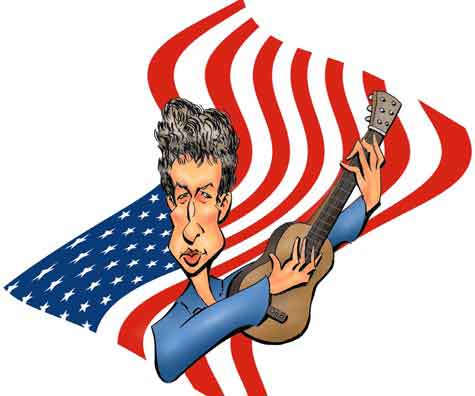
Nobel Laureate Robert Allen Zimmerman
"Bob" to his friends
One of the best but least heard of Cisco's recordings with Woody is the two part "Train Ride Medley" which combines a number of songs - "I Ride Old Paint", "Ride Around Little Dogies", "Bed on the Floor", "Chicago, Chicago" - into a narrative where he and Woody are riding the rails across the country. For some reason Moe left it on the cutting room floor and wasn't released until 1990 on an album with other of Woody's unreleased songs. What was unusual is that in "Train Ride Medley" Cisco took the lead, handling the narration, and Woody came in only in the singing. Cisco moves from his tenor to baritone easily and sometimes in the same song.
The Weavers
Pete Seeger, Ronnie Gilbert, Lee Hays, and Fred Hellerman
(Click on image to open larger view.)
Although the Almanac Singers had disbanded due to the extengencies of the war, in 1948 Pete Seeger had managed to put together a follow-up band with yet another not quite comprehensible name, The Weavers. The Weavers - which included another former Almanacker Lee Hayes as well as Ronnie Gilbert and Fred Hellerman - were surprisingly successful and in 1950 had a #1 hit on the national charts with the old Leadbelly song, "Goodnight Irene". The next year they had another Top Ten with a non-dusty variant of Woody's "So Long It's Been Good To Know Ya"2. Cisco, though, had some trouble launching a career and after the mid-1950's he was back in the West selling encyclopedias.
Footnote
The recordings that hit the top of the charts were actually billed as "Gordon Jenkins and his Orchestra and the Weavers". Gordon Jenkins was a well-known big band leader and although he got the top billing, he and his orchestra only provided the back up music. The big band sound and studio chorus was evidently deemed necessary to make the folk music appeal to the mainstream audiences. Today, though, these records sound horribly treacly and unintentionally humorous. Fortunately the Weavers made a lot of records accompanied only by Pete's banjo and Fred's guitar.
But it wasn't just that the studio bigwigs insisted on lush backing, some of the lyrics on the Weaver's first platters were altered to make them less objectionable to the easily offended. In the verse that Lee Hays sang in "So Long", he took what were essentially Woody's original lyrics:
The telephone rang, and it jumped off the wall.
That was the preacher, a-makin' his call.
He said, "Kind friends, this may be the end.
You've got your last chance at salvation of sin."
Well, the church it was jammed, and the church it was packed.
The pews were so crowded from front to the back*
That the preacher could not read a word of his text,
So he folded his specs, took up the collection, said
So long, it's been good to know ya,
So long, it's been good to know ya,
So long, it's been good to know ya,
What a long time since I've been home**
And I've gotta be driftin' along
... and changed them to the vastly inferior:
My telephone rang and it jumped off the wall.
That was the preacher makin' a call.
He said, "We're waiting to tie the knot.
You're getting married, believe it or not."
Well, the church it was jammed; the church it was packed.
The pews were crowded from the front to the back.
A thousand friends waited to kiss my new bride
But I was so anxious I rushed her outside; told 'em:
So long, it's been good to know ya,
So long, it's been good to know ya,
So long, it's been good to know ya,
What a long time since I've been home
And I've gotta be driftin' along.
Later in the Weavers concerts and without the orchestra, Lee would restore Woody's lyrics.
------------
*Woody's original line was "That dusty old dust storm had blown so black."
**Woody wrote: "This dusty old dust is a-getting' my home."
What caused Cisco problems was less his fine "unauthentic" singing voice and guitar playing but his politics. Cisco distinctly leaned to the left and never compromised his principles. He sometimes would even tease Woody after Woody was given a nationally broadcast radio program "Pipe Smoking Time" sponsored by Model Tobacco. I mean, if you're talking about someone who was able to tweak Woody's nose because of Woody's highfalutin' friends, we're talking about a true proletariat. So when a radio show that Cisco was hosting was suddenly canceled, people suspected Cisco's presence was making the sponsors nervous.
Then in 1958 three completely non-political and incredibly clean cut college kids, Dave Guard, Bob Shane and Nick Reynolds, released a single which rose to #1 on Billboard's Pop Chart. Its success was unprecedented to the extent that it instantaneously inspired a movie which appeared the following year. The Legend of Tom Dooley starring Michael Landon (Little Joe on Bonanza and Charles Ingalls - the father - on Little House on the Prairie) like many movies fiddles with the facts quite a bit and is now virtually forgotten.
Suddenly folk music was the rage, mainstream, and $ucce$$ful. Cisco was able to return to New York and pick up his career. He began recording for Vanguard - a top label - and in 1959 he was tapped by the United States Information Service (then part of the federal executive branch) to go on a three month good-will tour of India where among other things he sang "This Land is Your Land" for the Prime Minister, Jawaharlal Nehru, and his daughter Indira.
When he got back, Cisco really hit the big time. He was the host of a television special, for crying out loud! Appearing on the show were Joan Baez, John Lee Hooker and even Lester Flats and Earl Scruggs who played "Salty Dog Blues".
In February 1961 Cisco was booked at the New York nightclub, Gerde's Folk City. This was truly the height of folk fame. A month later on April 11 Bob Dylan appeared at Gerde's and received rave reviews. The folk music revival was really on. Ten days later, Cisco died.
References
"Cisco Houston: A Brief Look at his Life", Mark Eastman, Cisco Houston, ciscohouston.org
"Cisco Houston", All Music Guide: The Definitive Guide to Popular Music, Editors: Vladimir Bogdanov, Chris Woodstra, Stephen Thomas Erlewine, Backbeat Books, 2001.
"Cisco Houston", The Early Years of Folk Music: Fifty Founders of the Tradition, David Dicaire, McFarland, 2010.
Woody Guthrie: A Life, Joe Klein, Knopf, 1980.
Woody Guthrie L.A.: 1937 to 1941, Darryl Holter and William Deverell, Angel City Press, 2016.
Woody Guthrie Discography, Discogs
Cisco Houston Discography, Discogs
"Long Ways to Travel: The Unreleased Folkways Masters, 1944-1949", Woody Guthrie and Cisco Houston, Smithsonian Folkways Recordings, 1994.
"Musicians Recall Dylan's First Big Gig and 25 Years of Music History at Gerde's Folk City", Frank Mastropolo, Beford Bowery, September 29, 2017.
Cisco Houston, Stefan Wirz, American Music
The Beautiful Music All Around Us: Field Recordings and the American Experience, Stephen Wade, University of Illinois Press, 2015.
"Folk Sound USA", Mudcat Café.
